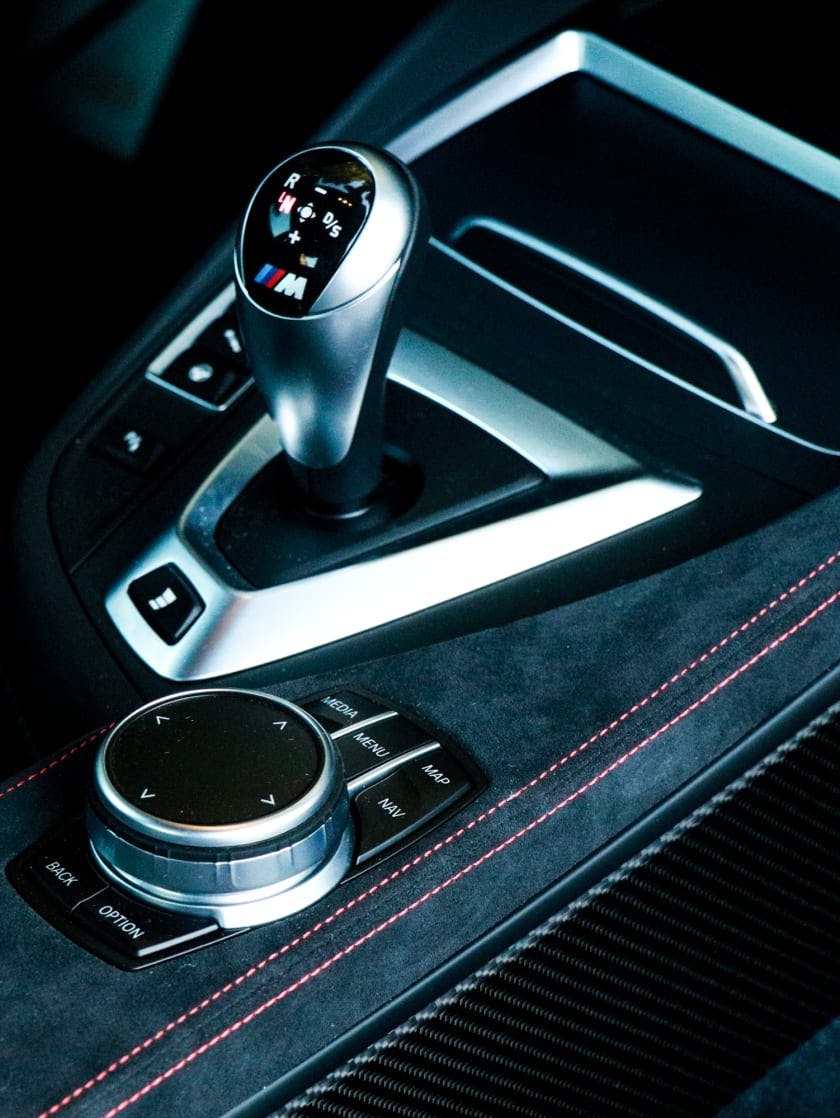
The Best M Car Ever? BMW M2 CS Review
Here's how the new BMW M2 stacks up to the M2 Competition.
The M2 CS is the final and most potent version of the current BMW 2 series, which in M format has evolved from the M235i, to the M2, and the the M2 Competition. The M2 Competition already has something of a cult following among BMW enthusiasts and is widely regarded as one of the best handling M cars ever produced due to its size, weight, and relatively short wheelbase. I have really been looking forward to having an opportunity to spend a week with the M2 CS, particularly given all the acclaim it has received in the motoring press, and it certainly lived up to my expectations.

The M2 CS is a limited edition and is clearly track focused, and the result of significant testing at the Nurburgring. Only 2,200 have been made with 500 coming to the US, so it is already unique.
As cars have generally increased in size over the years to provide more comfort and interior accommodation, they have also become bigger and heavier. Today’s M2 probably has more in common in terms of weight and dimensions with the legendary E46 M3 which is often considered as one of the most iconic and best handling M3s ever produced, particularly in the CSL form. With the M2 CS, which stands for Club Sport, BMW have taken the already highly capable M2 Competition, reduced the weight and improved performance. The M2 CS probably has more in common in terms of dimensions, weight, and handling with the the E46 M3 and has set a new standard for the M Series in terms of handling and performance, particularly on track.
With the CS, BMW has gone to great efforts to take weight out of the M2 with extensive use of carbon fiber, the most noticeable being the carbon fiber roof with its cross-hatch design, that takes out almost 22 pounds. The CS also has a carbon fiber hood with an additional vent and uses a carbon fiber extension to the front splitter, which gives it that lower aggressive look. There are also carbon fiber caps on the mirrors and carbon extends to the trunk spoiler and rear diffuser, which is the same as the M2 Competition.
My car was also fitted with the optional Carbon Ceramic brakes which trim another 55 pounds from the weight. The use of Carbon Fiber in the interior and removing the central armrest saves another 5.5 pounds. Some of these savings are offset by the DCT gearbox, if you elect that, as well as additional weight of oil and engine cooling and the M adaptive suspension. Overall, the M2 CS comes it at around 3,640 pounds and is around 55 pounds lighter than the M2 Competition.
The CS has 19 inch wheels on the front and 20 inch on the rear and my demo came shod with the excellent Michelin Pilot Sport Cup 2s, one of the best high performance track tires available, which underscores the seriousness of BMW’s track oriented intentions for the CS.
There are only four options available on the CS: A dual clutch automatic transmission (DCT), carbon ceramic brakes, M Light forged alloy gold wheels, and Michelin Pilot Sport Cup 2 Tires. My demo car came in the Misano Blue Metallic and fully optioned. The gold wheels might not have been my choice, but they really grew on me and are a clear visible differentiator from the M2 Competition.
Whilst the external changes are relatively minor over the Competition, the additional carbon fiber bits, particularly the roof, the larger rear spoiler, hood vent, front splitter, and of course the 5 spoke-gold wheels give the M2 CS a more aggressive and track-focused look. The rear has the same diffuser as the Competition, but it is in carbon and houses the square quad exhausts that are nicely detailed with the M logo.


The interior of the CS is minimalist, driver-centric, and straight to business with few distractions as you would expect. The M Steering wheel is trimmed with Alcantara with the signature blue and red M stitching. The Alcantara is also used on the doors, dashboard, transmission tunnel and sides of the seats, the black contrasting really nicely with the red stitching particularly on the CS embossed logo on the dash. The transmission tunnel is Carbon fiber, which also dispenses with the center armrest and together with the truly excellent high-winged sports seats sports that come from the M4, gives the interior of the M2 CS a clean, purposeful feel. The manually adjustable telescopic wheel has plenty of extension to get the wheel nice and close—I clearly have long legs and short arms as I generally have difficulty getting the wheel close, but the M2 was perfect. The seats are comfortable and supportive for track use, with excellent bolsters, plenty of thigh support and slats to accommodate a racing harness. They are also easy to get in and out for daily driving, though my only question is why BMW didn’t use a manual adjustment instead of electric, given all the efforts to save weight.
Instruments are simple and straightforward with classic analog speedometer and tachometer, clearly visible through the grippy steering wheel. The infotainment system feels a bit dated with its small screen, though utilizes BMW’s intuitive iDrive 6.0 system and the rotary control on the console is comfortable to use, even without the armrest. Sound comes from an excellent 12 speaker Harmon Kardon premium system.
The rear seats are compact, enough space for bags and groceries but not sufficient to seat adult passengers comfortably. The trunk is a pretty good size at 13.8 cubic feet, but the small opening and configuration are not super practical. But then again, most of these practicalities are not front and center of mind when you are buying a car at this price that is so oriented to track use.
Overall the interior, whilst a bit on the sparse side, is well finished and feels functional and very much designed for the intended use.

The M2 CS used the same 3.0-liter twin-turbo I6 engine as the M2 Competition, however, the power for the CS has been increased from 405hp to 444hp, this is the same upgraded power unit used for the M4 Competition. Both the M2 Competition and CS produce the exact same 406 pounds feet of torque. Power comes in at around 2,350 rpm so the CS feels immediately responsive with minimal lag and the inline six explosively and raucously delivers pulling all the way through to the 7,600rpm red line. With the reduced weight and additional power, the CS is 0.2 seconds faster than the Competition from 0-60, clocking in at 3.8 seconds for the automatic version with the seven-speed dual-clutch-transmission (DCT). The top speed is limited to 174 mph.
There is a lot of debate about the manual versus automatic versions of the M2 CS, many purists will opt for the six-speed manual that comes as standard. However, despite growing up in the UK with a bias to manual transmissions, I would opt for the DCT as it is an absolute delight. It’s smooth, quick and precise in normal auto mode and gear selections are perfectly calibrated to the aggressive performance delivered from the howling inline-six-cylinder engine. Switching to manual mode using the paddles, the M2 rapidly shifts up and down the box and is incredibly fun and rewarding. The lack of torque converter takes a bit of adjustment and can be a bit lumpy pulling away at low speeds, but this is a reasonable trade off and easy to get used to. The DCT adds an additional $2,900 to the price, but in my view it is well worth it given the additional flexibility. And besides, it’s much easier to drift with both hands on the wheel.


The exhaust system on the CS uses dual-branch design with electronically controlled valves, and the exhaust note can be adjusted with the performance settings, though personally, I didn’t notice a significant difference.
The M2 CS uses the M Adaptive suspension, which is the first time BMW has put the electronic damper settings in the M2 and the CS can switch between Comfort, Sport and Sport+ settings. As a car built to offer race-track performance with the ability to also act as a daily driver, all the suspension settings are relatively stiff, even in comfort mode the CS ride remains firm, particularly with the Michelin Sport Cup 2 rubber.
My demo car was fitted with the optional M carbon-ceramic brakes, which in addition to significantly reducing weight provide sustained braking performance and minimize fade, particularly during extended track use. These ceramic systems are much improved, offering significant bite but they are also easy to modulate progressive braking at lower speeds. That said, they add a hefty $8,500 to the price so might only offer the returns if you intend to spend significant time on track.
Bringing all of this together, the M2 CS was clearly developed for the track with competition in mind and it is easy to see how all those hours BMW spent fine tuning the CS at the Nurburgring translates to exceptional performance. The CS is a joy to drive on the backroads, the twin turbo in-line six has real grunt and the short wheel-base and stiff suspension, combined with the Michelin Sport Cup 2’s make the M2 CS incredibly nimble and grippy. Powering out of corners the active locking rear diff modulates the power delivery between the rear wheels for enhanced traction. The steering weights up nicely into the turns and there is a great feeling of connectivity, with the carbon fiber strut brace keeping the nose nice and stiff under tight cornering. Despite the power to weight ratio, the CS is fun and confidence inspiring, the additional weight of the engine in the front end makes it easier to control understeer with a dab of power and getting the back end to step out feels controlled and manageable.

With the M2 CS, BMW has taken an already highly capable and proven platform with the M2 Competition and further enhanced its performance characteristics. This is the final version of the current M2 before the 2 series is redesigned for 2022, it is a limited single year production run of 2,200 units of which only 500 will be sold in the US. The downside is the price, which at $83,600 for the base car is almost $25,000 more than the M2 Competition. This car was equipped with the M Carbon Ceramic Brakes—$8,500, DCT—$2,900 and with the Misano Blue paint at $500, which came to $96,545 including the destination charge. This prices the M2 CS directly with the Cayman GT4, which comes in at $101,200. That said, with only 500 BMW M2 CS being sold in the US, most of them are likely already spoken for and pricing does not appear to have been an issue in terms of demand.
So, is this the best M car ever? I am sure this will be hotly debated subject. What I can say is that after a highly entertaining week with the M2 CS, it seems to have very much set a new bar. I am entirely obsessed with this incredibly fun and capable car and it has certainly left me craving my next BMW M Series experience.
For more information visit: BMW CS
Photos courtesy of James Henderson.









